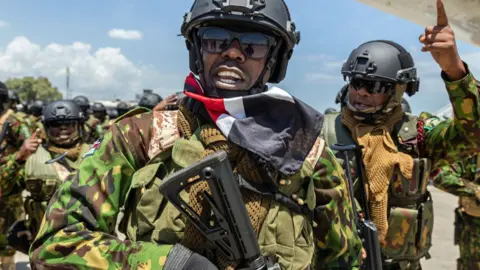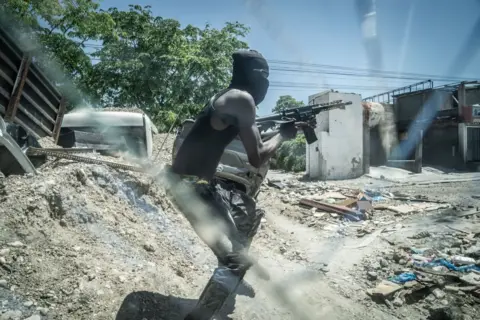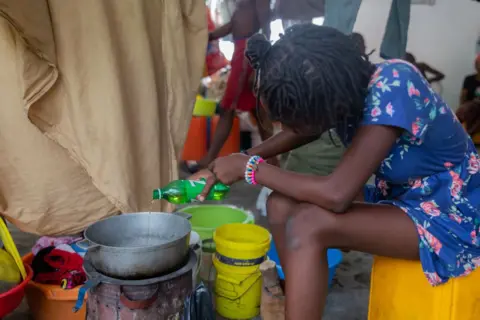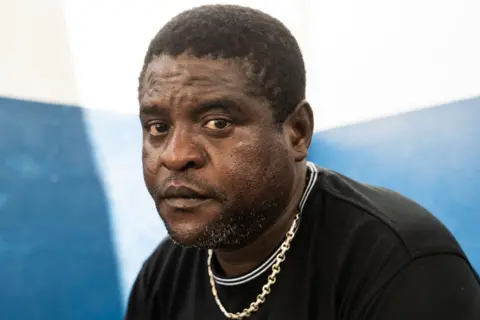 Getty Images
Getty ImagesWhen the first contingent of 200 elite Kenyan police officers flew into Haiti’s capital Port-au-Prince on 25 June, they filed confidently off their Kenyan Airways flight clad in helmets and combat gear, carrying their weapons and holding high the Kenyan national flag.
They chanted in Swahili while they psyched themselves up on the airport tarmac, as did a second batch of 200 Kenyan officers who landed three weeks later.
“Let’s go!” and “We’re moving!” came the cries.
Hopes were high that the Kenyan police would bring much-needed muscle to Haiti’s beleaguered National Police (PNH), as they struggled to hold back a deadly offensive by Haitian criminal gangs that have terrorised the capital and large swathes of the country for more than three years.
The Kenyans are the advance guard core of a UN-mandated, multinational force that will seek to restore peace to Haiti.
They were initially welcomed and feted by Haitian government leaders, and by many in Haiti’s media too.
Radio Independante FM posted on X a welcome greeting in the country’s Creole language for the Kenyans, saying:
“Haiti is the country of all Africans. Since you are black Haiti is your home… You Kenyan soldiers are at home and must be welcomed to help fight these wasters [the gangs] that prevent us from living in our country”.
However, weeks after the much anticipated deployment, which had already been delayed by legal challenges in Kenya and logistical hitches, many Haitians seem frustrated and disillusioned that the force, along with their Haitian police colleagues, have not moved more quickly and decisively against the gangs, their bosses and their known hideouts.
 Getty Images
Getty ImagesFrustrated commentary, expressing impatience and disappointment, is on the rise in Haitian media and social media circles.
There has been chorus of calls for “actions not words” and “concrete results”.
Some of the sharpest criticism accuses the Kenyans of “theatrics” and being mere “tourists”.
Critics point out that – despite high-profile joint patrols by Kenyan and Haitian police in Port-au-Prince where they have exchanged fire with suspected gangmen – the gangs only seem to have tightened their grip on the capital’s south-western and north-eastern suburbs since the Kenyan mission began.
Gang members have attacked and burned or partially destroyed police stations and continue to prey on major highways out of the capital and inland.
There is a feeling among some that the Kenyan force has been too slow to make its presence felt.
“What are the Kenyans waiting for to act against the bandits?,” asked local news outlet AyiboPost in an article posted to X on 11 July, a fortnight after the East Africans landed.
Some two weeks later, online news website Le Filet Info was commenting pointedly: “The presence of the Kenyan police in the country does not manage to frighten the bandits.
“They continue to massacre members of the civilian population.”
 Getty Images
Getty ImagesThe Kenyan contingent has already experienced its first casualty since arriving in Haiti.
On 30 July, a Kenyan policeman received a gunshot injury in the shoulder in Port-au-Prince when a Kenyan patrol engaged gang members.
That same day, the Haitian police chief Rameau Normil, accompanied by the Kenyan force commander Godfrey Otunge, appeared to try to counter unfavourable local media commentary by announcing that more than 100 “bandits” had been killed by the Haitian and Kenyan police in operations conducted under a state of emergency declared in the most gang-plagued zones since mid-July.
Such statements however have not succeeded in placating public scepticism.
Confidence was not improved by the publication online of videos showing top Haitian government officials, as well as Kenyan and Haitian police escorting them, making a hasty retreat on 29 July, amid a barrage of gunfire, from the abandoned General Hospital in downtown Port-au-Prince they had just visited.
Both Haitian and Kenyan police had said this facility was firmly under their control.
Despite such criticism Haiti’s interim Prime Minister Garry Conille told BBC HARDtalk he welcomed the support given how undermanned the Haitian police are.
“We do need the help… yet it’s coming in too slow and Haitians are growing impatient,” he acknowledged.
The prime minister also batted off those who questioned the deployment of Kenyan officers given their heavy-handed handling of recent anti-government riots at home.
“The respect for our laws and operational procedures have been very very good and we’re very happy with the accompaniment we’re receiving,” he said, emphasising that the role of the Kenyans was to support and accompany the police – not operate independently.
Nonetheless the Kenyans have faced open defiance from prominent Haitian gang leaders.
 Getty Images
Getty ImagesOnly days after the arrival of the first group of Kenyans, Jimmy “Barbecue” Chérizier, an outspoken leader of the “Viv Ansanm” (Live Together) gangs coalition, appeared in a provocative video lasting almost eight minutes that was posted on X.
Leading his masked foot soldiers in a strutting, chanting war dance through his Delmas 6 stronghold, they held their automatic weapons aloft.
“Here’s Kenya [the Kenyans], bullets [for them],” they chanted in Creole at one point.
Other gang leaders, including Wilson “Lanmo Sanjou” Joseph, the boss of the “400 Mawozo” gang, and youthful gang chief “Ti Bebe Bougoy”, have also been appearing in videos taunting both Haitian authorities and the Kenyans, while the gangs continue to boast of their attacks.
In mid-July, the Kenyan contingent of the multi-national force launched their own X account, @MSSMHaiti, in a bid to set the tone of the public narrative of their mission in Haiti.
Its daily reports on the Kenyans’ activities range from receiving visiting dignitaries at their base, to human rights lessons, and upbeat accounts of “reassurance” patrols on the streets of Port-au-Prince.
But the determined optimism of the @MSSMHaiti stream, particularly references to “significant success” and “gradual return to normalcy”, appears to have rankled many in Haiti.
Some Haitians have denounced the Kenyan reports as, at best, overblown – and, at worst, “propaganda”.
You may also be interested in:
 Getty Images/BBC
Getty Images/BBC









